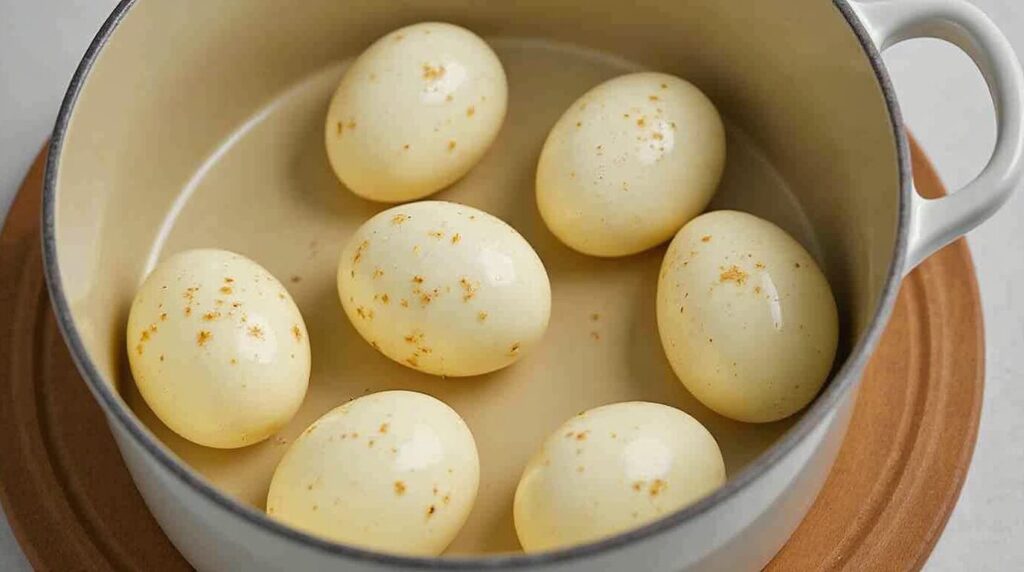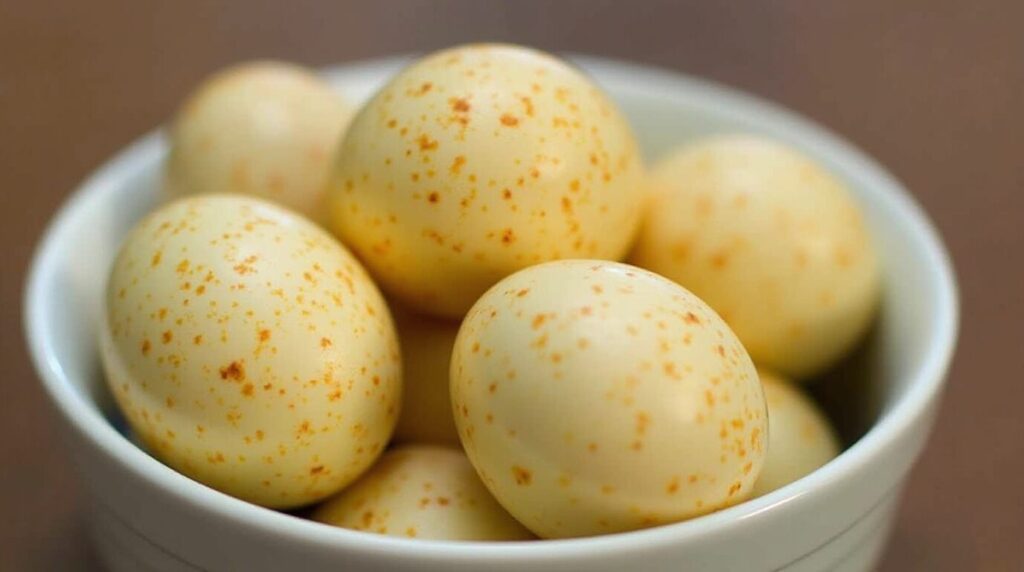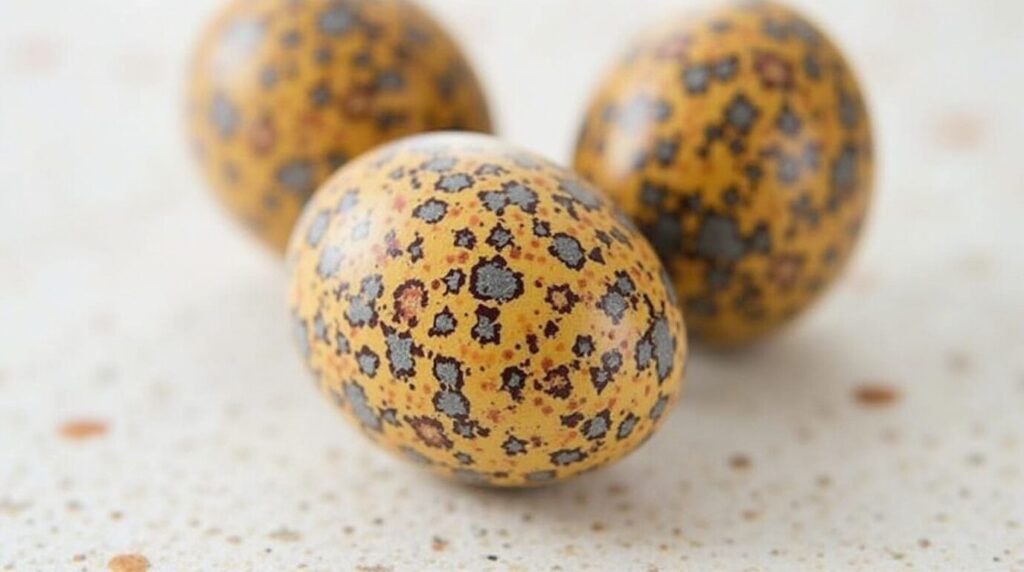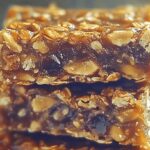Quail eggs are a small yet mighty addition to any kitchen. Their unique flavor and nutritional benefits make them a favorite among chefs and home cooks alike. In addition, knowing how long to cook a quail egg ensures that you achieve your desired texture, whether soft-boiled, medium-boiled, or hard-boiled. Above all, mastering this simple technique will elevate your cooking and impress your guests. Here’s everything you need to know about boiling quail eggs, including step-by-step instructions, creative serving ideas, and answers to frequently asked questions.
Why Quail Eggs Are a Delightful Choice
Quail eggs are not only nutrient-dense but also visually stunning, making them a favorite among chefs and home cooks alike. For example, they boast higher levels of vitamin B12, iron, and selenium compared to chicken eggs, providing essential nutrients in every bite. Moreover, their petite size and creamy yolks lend themselves perfectly to salads, appetizers, and other elegant dishes that demand a sophisticated touch.
On the other hand, their smaller size requires precise timing during cooking to avoid overcooking, as even a minute can significantly alter their texture. As a result, quail eggs are highly valued for their quick preparation, which makes them an excellent choice for busy individuals seeking a healthy, flavorful option. In short, these tiny gems are perfect for anyone looking to add a visually appealing and nutritionally rich ingredient to their meals. For additional information about their health benefits, quail eggs are packed with antioxidants and nutrients that support overall well-being.
The Unique Culinary Appeal of Quail Eggs
When it comes to gourmet ingredients, quail eggs hold a special place. Not only do they enhance the flavor of dishes, but they also elevate their presentation. For instance, their delicate speckled shells and creamy yolks are visually enticing, making them an excellent choice for canapés and hors d’oeuvres. Similarly, their versatility allows them to be used in a variety of recipes, from soups and salads to pickled egg platters.
Moreover, quail eggs cook quickly and lend themselves to creative culinary experiments. In addition to traditional boiling, they can be fried, poached, or baked into pastries for an unexpected twist. Above all, their flavor is rich yet mild, blending seamlessly with both bold and subtle seasonings. With their combination of elegance and practicality, quail eggs are a prized ingredient for professional chefs and culinary enthusiasts alike.
Health Advantages of Including Quail Eggs in Your Diet
Quail eggs are a powerhouse of nutrition, offering numerous health benefits in a small package. In fact, they are an excellent source of protein, supporting muscle growth and repair. Additionally, their high content of iron and B vitamins helps combat fatigue and anemia, while selenium and zinc boost the immune system.
On the other hand, quail eggs are lower in cholesterol than many people assume, making them a good option for those monitoring their heart health. For example, their antioxidants help reduce inflammation and oxidative stress in the body. Moreover, they are often used in traditional remedies for improving skin health, enhancing metabolism, and alleviating respiratory conditions. Incorporating quail eggs into your diet can be a simple yet impactful way to improve overall health.

Versatile Cooking Options for Quail Eggs
Quail eggs are incredibly versatile in the kitchen, offering endless possibilities for creative dishes. For example, they can be soft-boiled and served atop toast or hard-boiled and used as a topping for salads and noodle dishes. In contrast, they can also be pickled with spices for a tangy and colorful snack.
Moreover, quail eggs are perfect for making mini Scotch eggs, where they are wrapped in sausage and breadcrumbs before frying. Similarly, they can be poached and added to soups or stews for a luxurious touch. Additionally, their small size makes them ideal for bite-sized appetizers that are both functional and decorative. Whether you’re cooking a casual family dinner or hosting a formal gathering, quail eggs can add a touch of sophistication to your menu.
How to Select and Store Quail Eggs
Selecting fresh and high-quality quail eggs is essential for the best results in cooking. In addition to checking the expiration date, examine the shells for cracks or signs of damage. For instance, a fresh quail egg should have a firm shell and feel slightly heavy for its size.
Once purchased, quail eggs should be stored in the refrigerator to maintain their freshness. In fact, they can last up to three weeks when kept at the proper temperature. On the other hand, leaving them at room temperature can significantly reduce their shelf life. Additionally, always wash the eggs gently before using them to remove any surface contaminants. With proper care, quail eggs can be enjoyed at their freshest and most flavorful., visit our dedicated guide.
How Long to Boil Quail Eggs?
.The cooking time for quail eggs depends on the texture you prefer:
- Soft-Boiled: Boil for 2–3 minutes to achieve a runny yolk and delicate whites.
- Medium-Boiled: Boil for 3–4 minutes to create firmer whites and a slightly jammy yolk.
- Hard-Boiled: Boil for 5 minutes for completely cooked yolks and whites.
In addition, it is important to start timing once the water reaches a rolling boil, as this ensures consistency. Moreover, maintaining a steady heat throughout the process helps the eggs cook evenly. As a result, you can avoid issues like undercooked or rubbery eggs. For example, if the water temperature fluctuates, the yolks may cook unevenly, leaving you with inconsistent results. On the other hand, following these precise timings guarantees perfectly boiled quail eggs every time. In conclusion, timing and consistent heat are key to achieving the desired texture.
Boiling Techniques for Quail Eggs
To boil quail eggs successfully, using the right technique is essential. For instance, gently lowering the eggs into the boiling water with a slotted spoon minimizes the risk of cracking. In addition, adding a pinch of salt or a splash of vinegar to the water can strengthen the shells, preventing them from breaking.
Moreover, a consistent rolling boil ensures even cooking. However, if the water boils too vigorously, the eggs may bounce around and crack. Consequently, gentle boiling is the preferred method. After the eggs have boiled for the desired time, transferring them to an ice bath is crucial. In fact, this halts the cooking process immediately and ensures that the yolks remain creamy or firm, depending on your preference. Above all, the ice bath also makes peeling much easier.
Common Mistakes to Avoid When Boiling Quail Eggs
While boiling quail eggs is straightforward, certain mistakes can affect the outcome. For example, overcooking quail eggs can lead to rubbery whites and a greenish yolk. In addition, failing to cool the eggs in an ice bath can make peeling difficult, as the membrane tends to stick to the shell.
On the other hand, starting the eggs in cold water instead of boiling water can lead to uneven cooking. Similarly, crowding too many eggs in a small pot can prevent proper heat distribution. Moreover, using high heat throughout the process may cause the eggs to crack. In short, paying attention to details such as water temperature, cooking time, and cooling methods ensures flawless results. Above all, avoiding these mistakes saves you time and frustration.
Creative Serving Suggestions for Boiled Quail Eggs
Boiled quail eggs are not only versatile but also perfect for various dishes. For instance, soft-boiled quail eggs can be served atop avocado toast or noodle bowls for a luxurious touch. Similarly, medium-boiled eggs are excellent in salads, where their jammy yolks add richness and flavor.
Moreover, hard-boiled quail eggs can be sliced and used as a garnish for soups or canapés. In contrast, they can also be pickled for a tangy snack that’s both delicious and colorful. Additionally, quail eggs pair wonderfully with smoked salmon, truffle oil, or caviar for a sophisticated appetizer. Above all, their petite size and aesthetic appeal make them a favorite for parties and gatherings. In conclusion, their versatility ensures they can be adapted to a wide range of culinary creations.
How to Ensure Easy Peeling
Peeling quail eggs can sometimes be challenging, but the right techniques make it easier. In addition, cooling the eggs in an ice bath immediately after boiling helps the shells contract, separating them from the egg whites. Moreover, rolling the eggs gently on a hard surface cracks the shell evenly, making it easier to peel.
On the other hand, using slightly older eggs can also make peeling simpler, as the membrane inside the shell tends to loosen with time. For example, adding vinegar or baking soda to the boiling water helps break down the inner membrane, facilitating the peeling process. In short, these small adjustments can save you time and effort while peeling quail eggs. Consequently, you’ll enjoy perfectly peeled eggs ready for any recipe or snack. Above all, patience and gentle handling are key to achieving cleanly peeled quail eggs.
For a detailed cooking guide and more preparation tips, explore our cooking techniques section.

Step-by-Step Instructions for Boiling
Ingredients
- Fresh quail eggs
- Water
- A pinch of salt (optional)
Tools
- Small saucepan
- Slotted spoon
- Bowl of ice water
Directions
- Prepare the Water
First, fill a saucepan with enough water to cover the quail eggs. Bring it to a gentle boil over medium-high heat. Additionally, adding a pinch of salt can help prevent the eggs from cracking during cooking. - Add the Quail Eggs
Next, carefully lower the eggs into the boiling water using a slotted spoon. In contrast to dropping them directly, this reduces the likelihood of cracking. - Set the Timer
Depending on your desired doneness, set a timer: 2 minutes for soft-boiled, 3–4 minutes for medium-boiled, and 5 minutes for hard-boiled eggs. In short, using a timer eliminates guesswork and ensures perfect results. - Cool the Eggs
After the timer goes off, immediately transfer the eggs to an ice bath. In addition to halting the cooking process, this step makes peeling significantly easier. - Peel and Serve
Finally, tap each egg gently to crack the shell and peel it under running water. As a result, you’ll have perfectly peeled eggs ready to enjoy.
For more detailed recipes and serving suggestions, check out our recipe ideas section.
Tips for Perfect Results
For consistently excellent results, follow these essential tips:
- Freshness Matters: Fresh eggs cook evenly, but slightly older eggs are easier to peel.
- Avoid Overcrowding: Cook the eggs in a single layer to ensure even heat distribution.
- Use Additives: Adding vinegar or baking soda to the water can make peeling smoother.
- Stop the Cooking Process: Always cool the eggs in an ice bath to prevent overcooking.
In addition, experimenting with cooking times can help you discover your favorite texture. For instance, some people prefer the rich creaminess of a soft-boiled yolk, while others favor the firmness of a fully cooked egg. Above all, practice makes perfect.
Creative Serving Ideas
Quail eggs are as versatile as they are delicious. For example, you can use them to:
- Top Salads: Add elegance to your favorite greens.
- Garnish Ramen Bowls: Enrich the flavor and texture of your ramen.
- Pickle Them: Create vibrant pickled eggs with beet juice, vinegar, and spices.
- Serve as Appetizers: Pair them with salt and pepper for a simple yet luxurious snack.
Moreover, their unique size and appearance make quail eggs a favorite for parties and gourmet plating. For inspiration, visit our recipe collection.
Frequently Asked Questions
How to make quail eggs peel easier?
Cool the eggs in an ice bath immediately after boiling. Additionally, adding vinegar or baking soda to the boiling water can help break down the membrane.
Is 20 minutes too long to boil quail eggs?
Yes, 20 minutes is excessive. In contrast to chicken eggs, quail eggs cook in just 2–5 minutes.
Do quail eggs float when boiling?
Fresh quail eggs sink in water. On the other hand, floating eggs might indicate that they are older and possibly unsafe to eat.
Are quail eggs healthier than chicken eggs?
In fact, quail eggs contain higher levels of nutrients like iron, selenium, and vitamin B12, making them a healthier choice. For more on their benefits, read our quail eggs overview.
Conclusion
In conclusion, boiling quail eggs is an easy and rewarding cooking technique that can elevate your meals. Whether you enjoy them soft-boiled, medium-boiled, or hard-boiled, the key to success lies in precision and practice. In addition, their versatility makes them a perfect choice for salads, appetizers, and more.
For more culinary ideas and recipes, explore these trusted resources: Tasty, All Recipes, and Delish. Above all, quail eggs are a delightful addition to any table.







